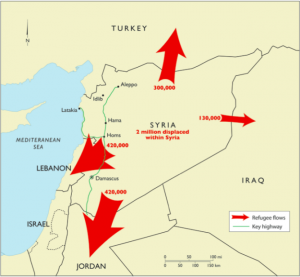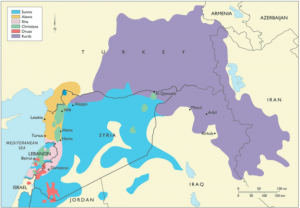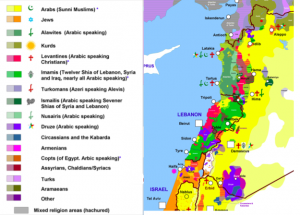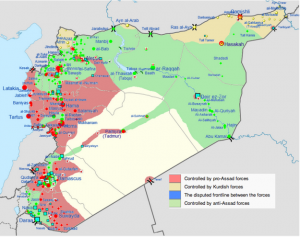
Post-Assad Syria: Turkey’s Perspective
I just finished reading the Bipartisan Policy Center‘s paper U.S. – Turkish Cooperation Towards A Post Assad Syria. I knew I had been missing nuance but I did not realize how much complexity there was in the relationship between the two countries.
First, Syria has been spilling refugees all over the region. Jordan is poor, Iraq is fragile and even their smaller contingent is causing trouble. Lebanon experiences a fragile balance of ethnic and sectarian tensions. The 420,000 new residents upset that balance and threaten to tip the country into chaos like it had in the 1980s.

Second, the Kurds were mostly at peace with Turkey until Syria fell into disorder. The Syrian government withdrew from Kurdish turf to reduce their interest in the fighting, then it is possible both Syria and Iran had a hand in setting the Kurdish PKK‘s insurgency back in motion against Turkey. Neither Iran nor Syria wants any trouble with the Kurds in their territory, both want to preserve the Shia arc from Iran to Syria, Sunni majority Turkey has been trending more Islamist in its thinking, and has chosen to back the Sunni majority rebellion in Syria.

The Turkish choice to focus on the Sunni aspect of the rebellion rather than an inclusive government that would respect the Alawite, Druze, and Christian minorities is a sticking point for the U.S. If things go badly Syria may become a bigger, badder, bloodier version of what Lebanon was like thirty years ago.

This conflict is not another episode of Arab Spring, similar in spirit to Tunisia or Egypt. Those countries are fairly homogenous, while Syria’s ethnic patchwork and current conflict is probably more correctly viewed as similar to the dissolution of Yugoslavia. Syria was a bundle of Ottoman provinces, then it became a French protectorate, and for quite a while it was the southernmost extension of the Iron Curtain.

I lifted this map from the Wikipedia page for Syria and it is described as current for June of 2013. Hezbollah has sent fighters from Lebanon to assist the faltering regime. Russia has delivered supplies and offered troops for monitoring duty in the Golan Heights. I saw a report of 4,000 Iranian Troops on their way to Syria, but I am expecting that this is going to get debunked.
Syria’s misery has been fed both internally and by the agendas of regional players – Iran, Saudi Arabia, and Qatar have all had a hand in escalating things. Now the troubles are threatening to engulf immediate neighbors and destabilize the whole region. This can not be what any of them intended, but brinksmanship is an extremely touchy proposition in such a complex environment.



